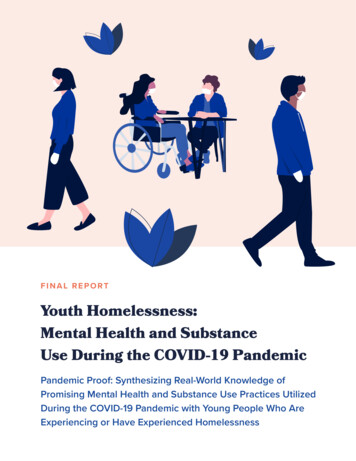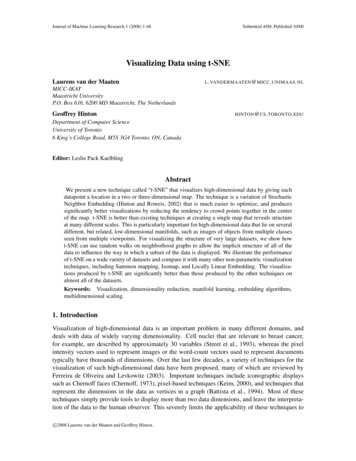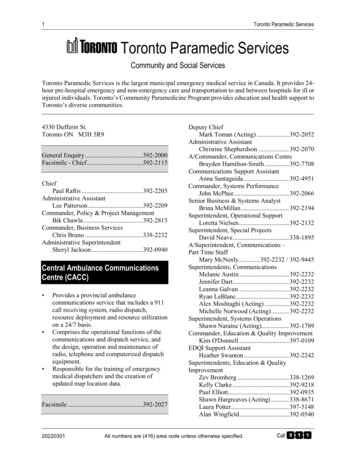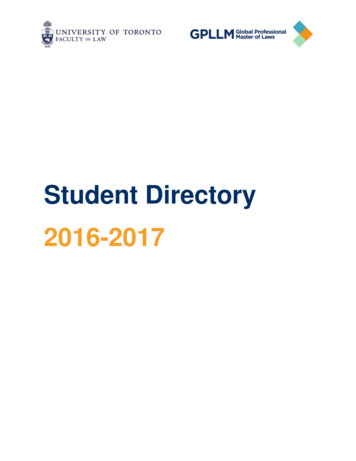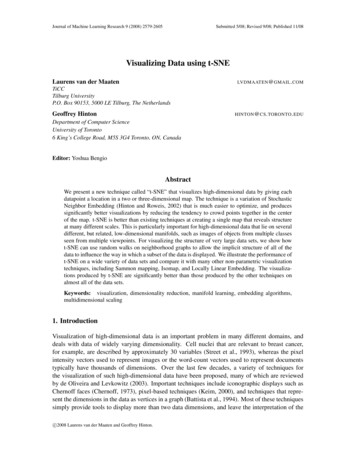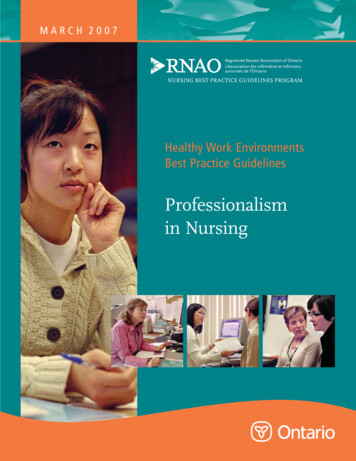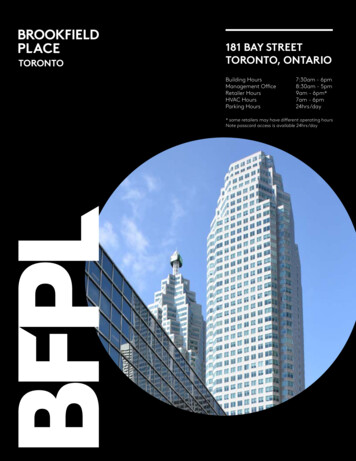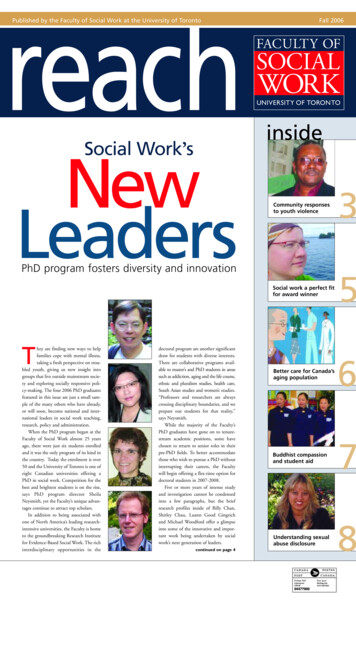
Transcription
Published by the Faculty of Social Work at the University of TorontoreachSocial Work’sNewLeadersFall 2006FACULTY OFSOCIALWORKUNIVERSITY OF TORONTOinsideCommunity responsesto youth violence3Social work a perfect fitfor award winner5Better care for Canada’saging population6Buddhist compassionand student aid7Understanding sexualabuse disclosure8PhD program fosters diversity and innovationThey are finding new ways to helpfamilies cope with mental illness,taking a fresh perspective on troubled youth, giving us new insight intogroups that live outside mainstream society and exploring socially responsive policy-making. The four 2006 PhD graduatesfeatured in this issue are just a small sample of the many others who have already,or will soon, become national and international leaders in social work teaching,research, policy and administration.When the PhD program began at theFaculty of Social Work almost 25 yearsago, there were just six students enrolledand it was the only program of its kind inthe country. Today the enrolment is over50 and the University of Toronto is one ofeight Canadian universities offering aPhD in social work. Competition for thebest and brightest students is on the rise,says PhD program director SheilaNeysmith, yet the Faculty’s unique advantages continue to attract top scholars.In addition to being associated withone of North America’s leading researchintensive universities, the Faculty is hometo the groundbreaking Research Institutefor Evidence-Based Social Work. The richinterdisciplinary opportunities in thedoctoral program are another significantdraw for students with diverse interests.There are collaborative programs available to master’s and PhD students in areassuch as addiction, aging and the life course,ethnic and pluralism studies, health care,South Asian studies and women’s studies.“Professors and researchers are alwayscrossing disciplinary boundaries, and weprepare our students for that reality,”says Neysmith.While the majority of the Faculty’sPhD graduates have gone on to tenurestream academic positions, some havechosen to return to senior roles in theirpre-PhD fields. To better accommodatethose who wish to pursue a PhD withoutinterrupting their careers, the Facultywill begin offering a flex-time option fordoctoral students in 2007-2008.Five or more years of intense studyand investigation cannot be condensedinto a few paragraphs, but the briefresearch profiles inside of Billy Chan,Shirley Chau, Luann Good Gingrichand Michael Woodford offer a glimpseinto some of the innovative and important work being undertaken by socialwork’s next generation of leaders.continued on page 4
Message from the DeanreachFaculty UpdateWhat’s happening around our world of Social WorkBuilding on our strengthsI’Mdelighted to be presenting youwith the first issue of Reach sinceI assumed my position as dean ofthe Faculty of Social Work this past summer. I consider it a great honour to lead an internationallyrecognized faculty, and I look forward to sharing ouraccomplishments through this publication.There will be no shortage of good news storiesfor Reach in the years ahead because the Facultyis in a stronger position than ever before. I’ve hadthe privilege of observing the Faculty’s evolutionfirsthand, from my time as a master’s and doctoralFaculty Appointment News Professor Usha George, a member of the Facultyof Social Work since 1994, has been appointeddean of the Faculty of Community Services atRyerson University. George had served as associatedean since 1999 and held the Royal Bank Chair inApplied Social Work Research. She was instrumental in developing the Anti-racism, Multiculturalismand Native Issues (AMNI) Centre. Professor Ramona Alaggia has been appointedthe new associate dean of the Faculty of SocialWork. Alaggia has worked in the children’s mentalhealth field for over 15 years as a family therapist,group counsellor, clinical director and consultant.Her research examines child sexual abuse, theexperiences of sexual assault victims in the justicesystem (see page 8) and violence in families. Professor Faye Mishna has been appointeddirector of the Research Institute for EvidenceBased Social Work and the Centre for AppliedSocial Research at the Faculty of Social Work.Mishna practiced in the field of children’s mentalhealth for 20 years and is currently the Margaretand Wallace McCain Family Chair in Child andFamily. Her research interests range from bullyingto cyber abuse.student through to my roles as a field practiceResearch Funding Highlightseducator, professor and now dean.Today we are Professors Tahany Gadalla, Ramona Alaggiaand Aron ShlonskyDifferential responses in cases of domestic violenceMinistry of Children and Youth Services Professor Ernie LightmanVoices from Ontario: From research to policythrough community theatreSocial Sciences and Humanities Research Councilamong the top schools of social work in NorthAmerica for research productivity. Our researchinfluences government policies at both the provincial and federal level.We have strong partnershipswith over 100 community agencies, including collaborative research projects with many of these organi- Professor Peter NewmanHIV vaccine trial participation and communityengagementOntario HIV Treatment Network Professors Cheryl Regehr, Marion Bogo,Vicki LeBlanc and Aron ShlonskyAssessing children’s risk of abuse:The influence of context and worker variableson professional judgmentSocial Sciences and Humanities Research Council Professor Izumi SakamotoComing together: Homeless women, socialsupport and housingWellesley Central Health CorporationandRe-examining the “Canadian Experience”and acculturation: The missing context ofCanada’s high-skilled immigrantsWellesley Central Health CorporationFaculty of Social Work AlumniAssociation: 2006-07 Board MembersPresident1st Vice President2nd Vice PresidentPast PresidentTreasurerSecretaryBookplate ProgramAdvocacyMentoring ProgramMembers-at-LargePeter MurchisonMalcolm StewartDoreen WinklerAnthony McNameeEd ShaulVacantDoris GuyattMalcolm StewartBill SternSylvia Miller, Kay Karrys,Sheila Pollock,Jessica Bonney,Michael Sullivanzations. And our graduates continue to make significant contributions to the communities where theylive and to society as a whole – you’ll meet severalof these outstanding individuals in this issue.Without diminishing any of our successes, however, I believe there is still much work to be done.Alumni in MemoriamLillian Messinger, a respected couples and families counsellor for more than 50years, died on Nov. 21, 2005 at age 92. Messinger received her Diploma/We need to continue to build our researchCertificate in Social Work in 1935 and her MSW in 1959. She began her careerstrength, leading to the development of policies andwith Jewish Family and Child Service of Toronto. In the 1950s, she was invitedprograms that best meet the needs of individuals,to work at the Clark Institute of Psychiatry (now the Centre for Addiction andfamilies and communities.We are also ideally posi-Mental Health), where she stayed until the mid-1990s when she began a home-tioned to seize the opportunity to become thebased practice. For the last 20 years of her career, Messinger specialized in sec-country’s leader in social work practice education.As we strive to move the Faculty forward, you’llond marriages, writing a book on the subject called Remarriage: A Family Affair.Alumni Memorial Scholarshipbe able to watch our progress in the pages of thisThe family of Jean Shek has created a scholarship at the Faculty to honour herpublication.The aim of Reach will remain the same:long and distinguished career in social work and her firm belief in social justice.to keep you – our alumni, students, faculty andShek received her Diploma/Certificate in Social Work in 1943 and her MSWfriends – connected to the Faculty’s exceptionalin 1953. She later returned to the Faculty as a lecturer. Her career includedpeople and exciting new ventures.positions at St. Christopher House, the Social Planning Council of MetroToronto, the Volunteer Centre of Metro Toronto and the Ontario Associationof Social Workers. Known for her deep love of humanity and fighting spirit,she is remembered for her many campaigns against social injustice. Shek was86 when she passed away in Toronto on May 10, 2006.If you wish to contribute to The Jean Avon Shek Scholarship at the Faculty of Social Work, pleaseCheryl Regehrcontact Vivien James, Administrative Assistant, at 416-978-4437 or fund.fsw@utoronto.ca* The U of T Faculty of Social Work respects your privacy.We do not rent, sell or trade our mailing lists. Even if youdo choose to receive Reach, you may notify us at anytime to change your preference.Bookshelf: Recent Releases from Faculty and AlumniLaw for Social Work Practice in Canada, Oxford University PressBy Dean Cheryl Regehr and Karima KananiInterested in Reconnectingwith the Faculty?The Alumni Association is currently lookingfor new board members to get involved inareas such as Continuing Education, Advocacyand Faculty liaison. For more information,please contact us at alumni.fsw@utoronto.caor 416-978-4437.02Promoting Resilience in Child Welfare, University of Toronto PressEdited by Robert J. Flynn, Peter Dudding (MSW 1976) andJames Barber (former dean of the Faculty of Social Work)Social Work Practice: Concepts, Processes and Interviewing, Columbia University PressBy Professor Marion BogoWeb-Based Education in the Human Services, Haworth PressEdited by Professor Robert J. MacFadden, Brenda Moore, Marilyn Herie, Dick Schoech
Published by the Faculty of Social Work at the University of TorontoNew Academic Linkagewith Israeli UniversityFaculty of Social Work partners with Haifa University School of Social WorkSBiro, national president of the Canadian Friends ofHaifa University; and David Gidron, director ofIsraeli House, who was representing Ya’acov (Cobie)Brosh, Consul General of Israel in Toronto.“We hope that this partnership will lead to realand meaningful co-operation between the two universities,” said Gidron on behalf of Consul Brosh atthe event. “We can learn from each other, our experiences and our best practices in the field.” Biro saidHaifa University is a fitting institution for U of T tobe twinned with because of the Israeli university’s mission to promote pluralism and social democracy.“Haifa University is not just involved in advancingknowledge,” he said, “but also in improving the quality of life of the surrounding community.”Though it is a relatively modest initiative,Lightman says the partnership makes a crucial statement to Canada and the international community.“Haifa’s successful blending of Arab and Jewish faculty and students nicely complements our owncommitment to pluralism and diversity in education. In the grand scheme of things, a linkagebetween two departments of social work will probably not change the world, nor will it likely changethe minds of the British academics. It will, however, affirm the Faculty’s and U of T’s values anddemonstrate what is important to us.”Preventing Youth ViolencePanellists debate strategies at Alumni Association workshopPoverty, segregation, social program cuts,gangs – these hot-button topics were all upfor debate at an educational workshop onyouth violence held in conjunction with the 2006annual general meeting of the Faculty of SocialWork Alumni Association.“This is not a problem that social work alone canaddress,” said Malcolm Stewart, 1st vice-president ofthe alumni association and chair of its advocacy committee, who served as MC at the May 18 workshop.“It requires a multifaceted community response.”Moderated by Shirley Hoy, city manager of theCity of Toronto, the panel discussion featuredresearchers and community activists with a specialinterest in youth violence. The following are briefhighlights from their presentations:David Firang, a PhD candidate at the Facultyand researcher at the City of Toronto’s CommunitySafety Secretariat, described how the concentrationof poverty in certain urban neighbourhoods breedsyouth violence. Low-income housing developmentsin areas such as north Etobicoke and the Jane-Finchcorridor isolate young people from opportunities,role models and resources in other parts of the city.More than race and ethnicity, access and equity areroot causes of youth turning to violence and crime.“Segregation is not an ‘old-school’ problem,” saidFirang, but rather a contemporary issue that must beaddressed as part of efforts to reduce youth violence.Raymond Micah, executive director of theAfrican Canadian Social Development Council, summarized the content of the council’s 2006 “Crime andViolence Prevention Strategy.” The strategy tacklesthe problem of gun violence and crime and its disproportionate impact on the African-Canadian community. “We are annihilating each other one by one,”said Micah. He emphasized the importance ofabsolute honesty about the issue, coupled with a “very tough but supportive” action plan. Some of the council’s recommendations include stronger legal disincentives to crime and gun violence, special disciplinefocused second chance opportunities for AfricanCanadian youth charged with non-serious criminaloffences, and the establishment of African-CanadianYouth Friendship Clubs.Adam Chaleff-Freudenthaler, director of council relations for the Toronto Youth Cabinet, arguedthat young people need access to programs and services that allow them to “live with hope.” Social service cuts by the previous provincial government haveeroded youth programs, he said, and they must berebuilt. The 2006 Toronto Youth Strategy, developedby the youth cabinet and adopted by city council,calls for investment in policies, programs and services that engage youth and demonstrably improvetheir well-being. Chaleff-Freudenthaler cited examples such as accessible post-secondary education,affordable public transit, mentorship initiatives andyouth recreation programs.The Very Rev. Jacob William French, superintendent minister of the Ghana Methodist Church ofToronto, offered a faith-based perspective on preventing youth violence. He called on social workersand policymakers to work more closely with religious organizations when confronting the problem,saying that it is crucial not to neglect young people’sspiritual needs. Religious youth groups can cultivatepositive peer pressure and redirect youth fromgangs, he said, while religious values can reinforcethe preciousness of human life. “If we want to helpyoung people respect the sanctity of life as a highervalue, then faith-based groups can help.”For more information about the Faculty ofSocial Work Alumni Association and upcomingevents, please contact alumni.fsw@utoronto.ca or416-978-4437. Panellists from top to bottom:David Firang, Raymond Micah,Adam Chaleff-Freudenthaler andthe Very Rev. Jacob William French03Outreachassociation voted to boycott Haifa University andeparated by thousands of miles but united byanother Israeli university. While this decision wasa shared commitment to social justice and thesubsequently revoked, another union of British acaprinciples of academic freedom, the Faculty ofdemics later passed a similar motion – which alsoSocial Work and the Haifa University School ofproved to be short-lived. Here in Canada, theSocial Work in Israel have embarked on a partnerOntario division of the Canadian Union of Publicship that has opened up new opportunities for colEmployees (CUPE), representing more thanlaborative research and international education.200,000 workers, voted in May 2006 to support theThe initial inspiration for the academicglobal movement to boycottalliance grew out of severalIsrael. When Professor ErnieU of T faculty members’“We can learnLightman of the Faculty ofresolve to respond to an interfromeachother,Social Work heard about thesenational campaign to boycottboycotts, he and ProfessorsIsrael and its academic instituourexperiencesAndrea Litvack and Susantions. “While the boycott andStern formed a committee thatour desire to assert the imporand our bestultimately proposed the affiliatance of academic freedompractices intion with Haifa University.and equitable treatment forThe partnership was celeall groups of people sparkedthefield.’’brated at a Faculty event onthe association, it’s becomeJune 26 hosted by thevery clear that there are alsoConsulate General of Israel and sponsored bytremendous opportunities for mutual learning expeVivienne Grace Ziner and Glenmorris Cohen, bothriences between the two faculties,” says Dean Cherylboard members of the Canadian Friends of HaifaRegehr. Plans are already underway for research partUniversity. Attendees included Michael Feldman,nerships, faculty and student exchanges, a joint condeputy mayor of Toronto; Rose Wolfe, former U ofference and student practicum placements.T chancellor; Ariela Lowenstein, a professor atThe international campaign against Israel began inthe spring of 2005 when a British university teachers’Haifa’s Faculty of Welfare and Health Studies; Peter
reachCover storyPhDClass ofBILLY CHAN2006Managing key schizophrenia symptomsmay reduce violence against caregiversDuring his 16 years as asocial worker at the Centrefor Addiction and MentalHealth, Billy Chan has heardtime and again about acts ofviolence by people withschizophrenia against theircaregivers. While manyresearchers have studied the link between violenceand schizophrenia, he found little data on violencewithin families who care for relatives with schizophrenia. Inspired by his clinical experience and thisgap in the research, Chan decided to investigate theextent of the problem and the factors that contribute to physical assault and psychological aggression against caregivers.Of the more than 60 caregivers who took part inhis study, 26 per cent reported at least one severephysical assault and 44 per cent reported at leastone severe incident of psychological aggressionover the last year. The common thread in all ofthese acts of violence, Chan discovered, was theintensity of a cluster of delusional symptoms associated with schizophrenia called Threat/ControlOverride (TCO).TCO symptoms cause people to believe thattheir caregivers are threatening their safety and/ortrying to control them, and the stronger thesesymptoms were the more likely there was to be violence. Chan also found that caregivers’ critical comments, which are often triggered by the burden ofcare, contributed to psychological aggression inparticular. “Interventions to alleviate patients’ TCOsymptoms and lower caregivers’ stress – whichcould help reduce the tension between caregiverand patient – could decrease the risk of violence.”Present position: Social Worker, Assessmentand Triage Unit, Law and Mental Health Program,Centre for Addiction and Mental HealthSHIRLEY CHAUExposure to violence affects healthand well-being of homeless youthDespite their tough outwardappearance, Toronto’s streetyouth are not so hardenedthat they are unaffected bythe pervasive violence in theirlives. In fact, says ShirleyChau, they experience considerable distress and manycould benefit from psychological support services.Chau’s field work involved shadowing the city’shomeless youth for eight months. Six days per weekand up to 15 hours per day, she was with them – inshelters, on the streets, in coffee shops, whereverthey went. Eventually she earned their trust and04was able to get 165 youth to fill out a survey thatexplored their exposure to violence and its impacton their physical and mental health.The young people’s candour surprised Chau, asdid the emotionally gripping content of their stories. “These youth have seen more than most people ever will,” she says. Many of them fled familyviolence at home only to encounter it in new formson the streets: turf wars, drug deals gone wrong orstrangers targeting them for no reason. Almost halfreported exposure to significant violence on thestreets – whether as witnesses, victims or both – andthis exposure predicted psychological problemssuch as anxiety and depression.“The findings from this study are similar to previous research about the adverse impact of violenceon youth,” says Chau. “In particular, the findingssuggest a need for social workers to pay close attention to the youths' histories of violence and howthese experiences affect how they manage theireveryday experience.”Present position: Assistant Professor, School ofSocial Work, University of British ColumbiaOkanaganexclusion are often practices to survive – materially,culturally and subjectively. While they could assimilate, the price they would pay for that is enormousand would be an annihilation of self. So this assumedidea we have that social inclusion is a good thing forall people whether they want it or not is misguided.”Present position: Assistant Professor, School ofSocial Work, York UniversityMICHAEL WOODFORDTrust and respect bring communityvoices into policy process“Community participationis big business for government these days,” saysMichael Woodford. Contemporary policy-makers emphasize public involvement withthe stated aim of creatingsocial policies that are responsive to community needs, yet participatory policymaking is often experienced as meaningless to community participants. To make it an authenticengagement of community groups, WoodfordLUANN GOOD GINGRICHfound, not only is a political mandate necessary,Social inclusion not an ideal for some groupsbut there must also be bureaucratic will and support and a readiness among public administratorsThere is reason to questionto take a risk.the commonsense notion ofWoodford based his research on a study of polisocial inclusion as a universalcy-making by the Government of Newfoundlandand Labrador, where he formerly served as directorvalue in our society, saysof policy and strategic planning. Part of his thesisLuann Good Gingrich. Herinvolved analyzing four real-life cases of participaresearch developed a conception in the province: a citizens’ advisory council ontual model of social exclusocial development, a community-governmentsion,particularlyselfworking group concerning welfare services for vicimposed social exclusion, by examining the lives oftims of violence, a traditional consultation processa group of people who choose not to participate infor reforming welfare legislation and a communitymainstream society.government committee overseeing a provincial vioGood Gingrich set out to understand why thelence prevention strategy.Low German Mennonite migrant workers inIn all but the last case, they were positive examsouthern Ontario keep themselves apart from theples of authentic participatory policy-making. “Informal economy, the educational system and socialthe unsuccessful case, the commuinteraction outside their communinity participants never felt theyty. “They are a group of peoplePHD PROGRAM:were understood and heard by thewho work very diligently to mainQUICK FACTSpublic servants,” says Woodford.tain a distinct cultural, religious The Faculty of Social“The differences in mindsets wereand ethnic identity,” she says.Work was the first Canadiannot mediated.” His research showed“They seem to live their lives in aschool of social work tothat government players must beway that makes it difficult to getoffer a PhD programwilling to share power and demonahead.” Many in these diverse com 109 PhD students havestrate their confidence in themunities live in poverty, wear a tragraduated since the proprocess, while both sides shouldditional style of dress that subjectsgram launched in 1982strive to reconcile their differentthem to discrimination, do not The Faculty accepts upvalues and ideologies. “We’ve got tospeak English or read or write into 10 new students eachlook at participation as a relationalany language, and prefer not toyear from Canada andprocess involving trust, respect,send their children to school.across the worldsharing power and dynamic comThese choices are less about self There are 52 studentsmunication.”imposed social exclusion than aboutenrolled in the PhD propreserving a way of life, according togram for the 2006-2007Present position: AssistantGood Gingrich’s research. “Whatacademic sessionprofessor, School of Social Work,appear to be expressions of selfUniversity of Michigan
Published by the Faculty of Social Work at the University of TorontoAn Instinct forSocial WorkThe personal and professional connect foraward-winning MSW graduateAlumniMiia Suokonautio was supporting street kids, facilitating AIDS education in prisons and advocating for refugees before it ever occurredto her that social work would be a natural career choice. Once thatrealization came, she could not imagine doing anything else.“I thought my personal and political convictions would be my personal lifebut my work needed to be something else,” says Suokonautio, who receivedthe 2006 Hilary Weston Award for the top graduating Master of Social Workstudent. She has been active in social justice work at the local and internationallevel since high school, yet, until she began exploring graduate degree optionsand came across the MSW program, she assumed she would pursue her interests in math, science, political science or environmental studies. “Social workallows for all of these things to come together in a way that lets me understandthe world, understand change making and understand social justice work.Where the others could all fit me, more or less, it's social work that really feltlike a made-to-measure jacket.”After completing a degree in environmental studies at York University,Suokonautio spent the summer of 2000 working on a farm in Bowmanville,Ont., as a labourer-teacher with migrant Mexican workers. “Doing this workof accompaniment and advocacy made things start to sink in for me. It reallysparked what was to come.” Looking back now, she says that in the yearsbetween this job and the time she began her MSW in 2004, she was in factdoing social work. “I think my experiences during these years can all be con-Miia Suokonautiosidered social work because they had an underlying intention of working withpeople to better the lives of their communities, families and themselves.”Two of those experiences – both in Central America – particularly affectedSuokonautio and continue to inform her personal and professional life. Thefirst was a volunteer stint in El Salvador during which she was part of a teampresenting AIDS prevention seminars to prisoners. “Working with the prisoners was at first very difficult. But the differences there were between us – whichwere many – began to be overcome as we shared our stories, our ideas, ourhumour and our genuine desire to connect with one another.” She laterreturned to the region to help provide educational support to street kids inNicaragua. At her wedding, she and her husband requested donations in support of both of these projects instead of gifts.Suokonautio continued to work with people from Latin America when shereturned to Toronto in 2003, volunteering with the Centre for SpanishSpeaking Peoples and the FCJ Refugee Project. She managed to maintain someof these volunteer commitments during her studies at the Faculty while completing practicum placements at St. Christopher House and the United Way.Following graduation this past spring, Suokonautio left for her parents’homeland of Finland and plans to hit destinations in Eastern Europe, Russiaand Asia before arriving in Ghana in December, where she and her husbandhope to work with NGOs for at least a year. From there, she cannot say whereshe will go, but she knows that she will be following the path she was meantto take all along. “A commitment to solidarity work, to accompaniment, toalliance building and support, and to political action is what drives me, andhopefully what I am able to follow.”Cheryl MitriFinding andFostering StudentPotentialUniversity mentorship program targetsstudents from under-represented groupsWhen Cheryl Mitri first stepped onto the University ofToronto campus in 1997, she was a 24-year-old single parent and former high school dropout about to begin the Uof T Summer Mentorship Program. Fast forward to the summer of2006, and Mitri is not only a newly minted Master of Social Work graduate but is also helping to run that same mentorship program where shewas a participant just nine years ago.“I know personally that education is power. My education has given mepower over my own life, and I want to help other students find thatpower,” says Mitri, explaining her decision to take on the job of co-ordinating the six-week mentorship program at the Faculty of Social Work.Launched in 1994 as a way to attract more black students to medicalschool, the program has grown into a collaborative effort among sevenU of T faculties and several local school boards. The initiative targetspromising senior high school students who are under-represented inhigher education for reasons such as racial or ethnic background, socioeconomic status or difficult family circumstances. It aims to providethese youth with opportunities to explore the university and a professional career option of their choice – from engineering and nursing tolaw and social work – while obtaining two high school credits.Guided by Mitri, faculty advisor Ramona Alaggia and a high schoolteacher, the 14 students who chose to immerse themselves in social workthis summer learned about resumé writing, visited social service agencies,participated in workshops and completed research projects related tosocial work. Leading these students was an exhilarating and emotionalexperience, says Mitri, because she saw aspects of her young self in manyof them. At different times, she assumed the role of instructor, mentor andsocial worker. “I provided them with individual counselling if they needed it to deal with certain issues and do well in the program,” she says.For some participants, the program confirmed their interest in socialwork; for others it was a ways
areas such as Continuing Education, Advocacy and Faculty liaison. For more information, please contact us at alumni.fsw@utoronto.ca or 416-978-4437. Alumni in Memoriam Lillian Messinger,a respected couples and families counsellor for more than 50 years,died on Nov.21,2005 at age 92.Messinger received her Diploma/
